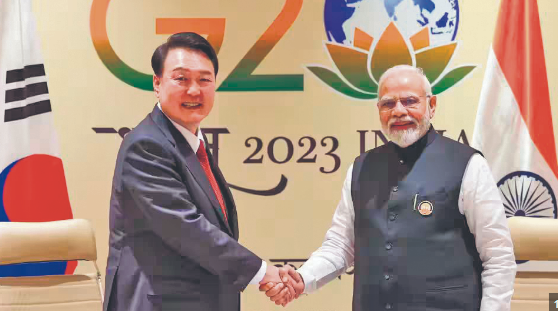Current Context
Recently, the visit of General Manoj Pande, Chief of the Army Staff of India, in November 2023, to the Republic of Korea (ROK), signifies a critical juncture in the trajectory of India-South Korea defence relation.
About
- India-South Korea defense collaboration is pivotal for international peace and stability.
- Absence of a shared vision for a comprehensive defense framework persists despite recent high-level engagements.
- Need for a robust structure to align policies and operate effectively in constructing a sustainable regional order.
- The imperative for India and South-Korea is to transcend the confines of bilateral cooperation, and embrace a paradigm shift that cultivates a more profound understanding of their roles in the swiftly evolving global scenario.

India-Korea Relations:
| History & Ties | Diplomatic relations since 1973, upgraded to “Special Strategic Partnership” in 2015. Historical link via Queen Heo Hwang-ok and shared Buddhist heritage. India supported Korean War efforts through medical personnel and ceasefire resolution. |
| Economic Partnership | Bilateral trade reached record high of $27.8 billion in 2022. India exports mineral fuels, cereals, and iron/steel; South Korea exports auto parts, telecom equipment, and iron/steel. “Korea Plus” initiative and SME Centre promoting Korean investments in India. |
| Cultural Connections | Indian Cultural Centre & India Centre in Busan promote cultural exchange. Annual SARANG festival showcases Indian art and music. Statues of Indian figures like Gandhi and Buddha installed in South Korea. Active Indian community of students, professionals, and diaspora associations. |
India- South Korea defense cooperation:
India played a crucial role in the Korean War:
- Led the Neutral Nations Repatriation Commission.
- Deployed a medical unit and custodian forces.
- Proposed the Armistice Agreement adopted by the UN.
Instituted forums for collaboration:
- Defense Policy Dialogue (now part of “2+2 Dialogue”).
- Joint Committee Meeting (defense industries & logistics).
- Steering Committee Meeting (joint defense R&D).
Areas of collaboration:
- Defense equipment co-production (e.g., K9 Vajra artillery), technology transfer, and joint exercises.
- Future-oriented cooperation in shipbuilding, aviation, semiconductors, and electric vehicles.
- Multilateral partnerships like QUAD and ASEAN-India Maritime Exercise showcase shared strategic interests.
- A Roadmap for Defence Industries Cooperation was signed between the two countries in September 2019.
- The 11th High Level Meeting between the two Coast Guards was held in April 2023 in New Delhi.
- A delegation from National Defence College visited ROK during 04-09 June 2023 on a study tour.
Technological collaborations in defence:
- Leveraging technological capabilities for joint development of advanced defence systems.
- Shared understanding of technology’s pivotal role in future conflicts opens limitless cooperation opportunities.
- Potential for a mutually beneficial defence technology and industry partnership propelling innovation and self-reliance.
- Exploring collaboration in space warfare, information warfare, and cybersecurity to ensure critical infrastructure security.
Peacekeeping, Exercises, and Regional Security:
- Utilizing UN peacekeeping expertise for collaborative efforts in enhancing regional and global stability.
- Collaboration in maritime security, including joint patrolling and information sharing in the Indian Ocean.
- Joint exercises and sharing best practices in Humanitarian Assistance and Disaster Relief (HADR).
- Extending cooperation beyond naval focus to strengthen army capabilities and foster interoperability.
- Emphasizing the need for a strategic, balanced approach and adaptability to navigate geopolitical complexities for enduring defence collaboration
Humanitarian Assistance and Disaster Relief (HADR)
- It is to exchange information and share the best practices on risk reduction and resilience, integration of Armed Forces in a regional response and disaster infrastructure and for promoting global collaboration among SCO members.
Challenges in India- South Korea defense relations:
- Resistance to Reassess India’s Role: The Korean government’s reluctance to view India beyond just a buyer of defense products.
- Shift from Cold War Mentality: The lingering Cold War perception of India as aligned with the Soviet bloc impeding deeper partnership.
- Paradigm Shift in Strategic Thinking: Lack of a necessary shift in Korean strategic thinking for meaningful engagement with India.
- Balancing Weapons Acquisition Focus: Overemphasis by India on acquiring weapons and technology transfer from Korea, potentially neglecting broader strategic considerations.
- Profit-Driven Approach: Korean defense establishment’s focus on profit from weapons sales to India, potentially overlooking strategic priorities in a dynamic geopolitical landscape.
- Navigating Powerful Arms Lobbies: Potential roadblocks arising from powerful arms lobbies in both countries, prioritizing short-term gains over long-term strategic goals.
- Emerging Coalition Challenge: The new coalition of North Korea, China, and Russia presenting complex strategic challenges requiring nuanced understanding of each party’s aims.
Way Forward
- To solidify and deepen India- South Korea defense ties, proactive steps beyond high-level visits are needed.
- Hosting a joint international summit on regional security, involving partners like the US and Japan, could foster a shared vision and robust framework.
- Additionally, participation in multilateral organizations like ASEAN Defense Ministers’ Meeting Plus and the Indo-Pacific Maritime Security Initiative could enhance regional collaboration and address shared strategic challenges.
Also Read :
Aadhaar-Based Payment System (ABPS) exemption on a case-to-case basis: MGNREGS

